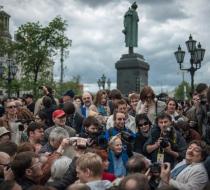A Dozen Writers Put Down Their Pens to Prove the Might of a March Favorite
There were no opposition leaders at the head of the vast column of people that peacefully wound its way through central Moscow on Sunday.
There was, instead, a corpulent poet, whose admirers thrust lilac boughs at him. A bespectacled detective novelist was autographing everything at hand — books, of course, but also scratch paper, identification cards and, once, a middle-aged woman in a white T-shirt. People mobbed a diminutive grandmother who has won many of Russia’s literary prizes and who acknowledged to a reporter that “crowds drive me crazy and make me want to hide somewhere.”
It was only four days ago when 12 prominent authors, disturbed by the crackdown on dissent that accompanied President Vladimir V. Putin’s inauguration, announced an experiment. They called it a “test stroll,” which aimed to determine whether it was possible to spend an afternoon walking en masse from one city park to another “without being blocked, beaten, poisoned with gas, detained, arrested or at least subjected to stupid molestation with questions.”
No one knew quite what to expect on Sunday. But when the 12 writers left Pushkin Square at lunchtime, they were trailed by a crowd that swelled to an estimated 10,000 people, stopping traffic and filling boulevards for 1.2 miles. Many wore the white ribbons that are a symbol of opposition to Mr. Putin’s government. The police did not interfere, although the organizers had not received a permit to march.
“We see by the number of people that literature still has authority in our society because no one called these people — they came themselves,” said Lev Rubinstein, 65, a poet and one of the organizers. “We thought this would be a modest stroll of several literary colleagues, and this is what happened. You can see it yourself.”
“I don’t know how this will all end, but I can say that no one will forget it,” he said.
Russian history is full of confrontations between leaders and writers, whom Stalin once described as the “engineers of the human soul.” Sunday’s march alluded to this, beginning at a statue of the poet Aleksandr S. Pushkin — who was sent into exile by Czar Alexander I — and ending at a statue of Aleksandr S. Griboyedov, a playwright whose sendup of the Moscow aristocracy was not released by czarist censors until after his death.
Though writers can no longer be said to guide public opinion, they can still prompt near-delirium among their fans, and several of the writers strolled with great difficulty on Sunday because of the press of well-wishers. Valentina V. Zimilova, 73, a retired teacher, was overcome with emotion when Dmitri L. Bykov, a poet and critic, signed a copy of one of his books for her.
“I am enraptured by his courage, his bravery, his wit,” she said. “I wrote down no less than 20 words that were new for me. It’s a wonderful book. You can’t tear yourself away, even though it is very thick. It has 900 pages.”
A week ago, when a large demonstration near the Kremlin ended in violent clashes between demonstrators and the police, the authorities signaled that they would hesitate to grant further permits for opposition marches. By evening on Monday, the day of Mr. Putin’s inauguration, the police had detained more than 700 people, some of them simply because they wore white ribbons.
In response, activists embraced a new set of tactics, including an encampment in a Moscow park that is modeled on Occupy Wall Street. The spot has been occupied without police interference, and the dread has given way to a surreal holiday atmosphere, including countless repetitions of the song “Katyusha” accompanied by acoustic guitar. On Thursday, the police detained eight young women in pig costumes. A cow appeared over the weekend, evidently to protest Russia’s accession to the World Trade Organization.
Olga Romanova, a longtime opposition activist, said she had given up trying to explain the situation in letters to her husband, who is in prison.
“I started to write, ‘There’s a wedding taking place here right now, and now a cow has come,’ ” Ms. Romanova said. “Then I understood that I have to cross it all out because he’ll think that I’ve gone crazy with grief or something is happening with me. How will they explain to Putin? There was a wedding. A cow came. How will they explain that?”
Organizers dispersed triumphantly on Sunday, though it was unclear what would come next in the cycle of action and reaction between the authorities and protesters.
Russia’s Parliament is considering a draft law that would increase fines for causing unrest at demonstrations to 1.5 million rubles, or about $50,000, and introduce a penalty of up to 240 hours of compulsory labor, according to the Interfax news service. The opposition leaders Sergei Udaltsov and Aleksei Navalny are serving 15-day sentences and could face stiffer penalties; meanwhile, the opposition encampment may be cleared at any moment.
Late Sunday, televisions in whole sections of Moscow cut to black in the middle of a news broadcast that covered the day’s protests. The cause of the cutoff was not clear.
Irina Yasina, one of the action’s organizers, said events like the one on Sunday confronted the government with a new and vexing dilemma because, as she put it, “writers are moral people, and the demand for morality is huge.”
“Moral people came out, and they don’t know what to do with this,” Ms. Yasina said. “They know what to do with Udaltsov — force against force. They know what to do with Navalny — force against force. They don’t know what to do with civic protest. They won’t be able to come up with anything. It’s impossible.”
Sophia Kishkovsky contributed reporting.







